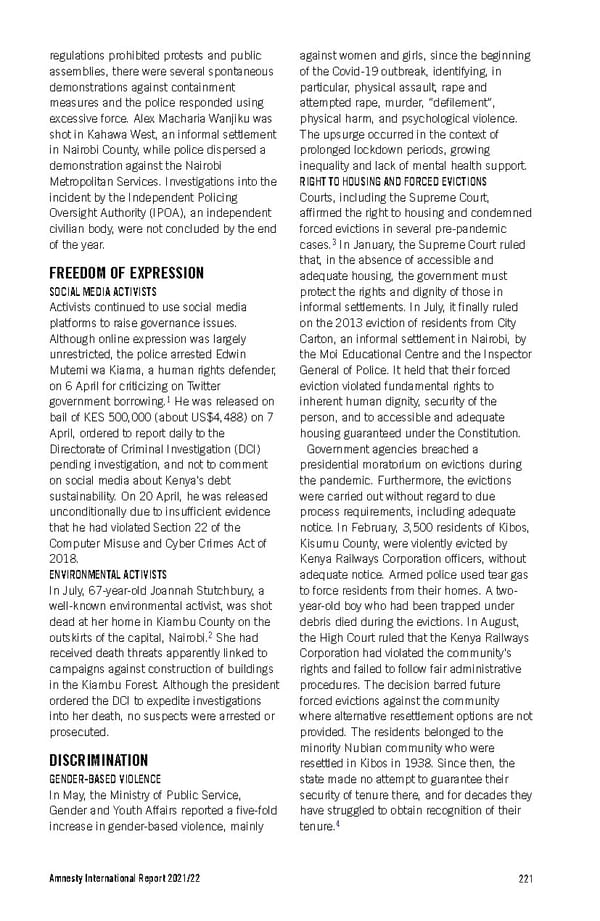regulations prohibited protests and public against women and girls, since the beginning assemblies, there were several spontaneous of the Covid-19 outbreak, identifying, in demonstrations against containment particular, physical assault, rape and measures and the police responded using attempted rape, murder, “defilement”, excessive force. Alex Macharia Wanjiku was physical harm, and psychological violence. shot in Kahawa West, an informal settlement The upsurge occurred in the context of in Nairobi County, while police dispersed a prolonged lockdown periods, growing demonstration against the Nairobi inequality and lack of mental health support. Metropolitan Services. Investigations into the RIGHT TO HOUSING AND FORCED EVICTIONS incident by the Independent Policing Courts, including the Supreme Court, Oversight Authority (IPOA), an independent affirmed the right to housing and condemned civilian body, were not concluded by the end forced evictions in several pre-pandemic 3 of the year. cases. In January, the Supreme Court ruled FREEDOM OF EXPRESSION that, in the absence of accessible and adequate housing, the government must SOCIAL MEDIA ACTIVISTS protect the rights and dignity of those in Activists continued to use social media informal settlements. In July, it finally ruled platforms to raise governance issues. on the 2013 eviction of residents from City Although online expression was largely Carton, an informal settlement in Nairobi, by unrestricted, the police arrested Edwin the Moi Educational Centre and the Inspector Mutemi wa Kiama, a human rights defender, General of Police. It held that their forced on 6 April for criticizing on Twitter eviction violated fundamental rights to government borrowing.1 He was released on inherent human dignity, security of the bail of KES 500,000 (about US$4,488) on 7 person, and to accessible and adequate April, ordered to report daily to the housing guaranteed under the Constitution. Directorate of Criminal Investigation (DCI) Government agencies breached a pending investigation, and not to comment presidential moratorium on evictions during on social media about Kenya’s debt the pandemic. Furthermore, the evictions sustainability. On 20 April, he was released were carried out without regard to due unconditionally due to insufficient evidence process requirements, including adequate that he had violated Section 22 of the notice. In February, 3,500 residents of Kibos, Computer Misuse and Cyber Crimes Act of Kisumu County, were violently evicted by 2018. Kenya Railways Corporation officers, without ENVIRONMENTAL ACTIVISTS adequate notice. Armed police used tear gas In July, 67-year-old Joannah Stutchbury, a to force residents from their homes. A two- well-known environmental activist, was shot year-old boy who had been trapped under dead at her home in Kiambu County on the debris died during the evictions. In August, 2 outskirts of the capital, Nairobi. She had the High Court ruled that the Kenya Railways received death threats apparently linked to Corporation had violated the community’s campaigns against construction of buildings rights and failed to follow fair administrative in the Kiambu Forest. Although the president procedures. The decision barred future ordered the DCI to expedite investigations forced evictions against the community into her death, no suspects were arrested or where alternative resettlement options are not prosecuted. provided. The residents belonged to the DISCRIMINATION minority Nubian community who were resettled in Kibos in 1938. Since then, the GENDER-BASED VIOLENCE state made no attempt to guarantee their In May, the Ministry of Public Service, security of tenure there, and for decades they Gender and Youth Affairs reported a five-fold have struggled to obtain recognition of their 4 increase in gender-based violence, mainly tenure. Amnesty International Report 2021/22 221
 Amnesty International Report 2021/22 Page 220 Page 222
Amnesty International Report 2021/22 Page 220 Page 222